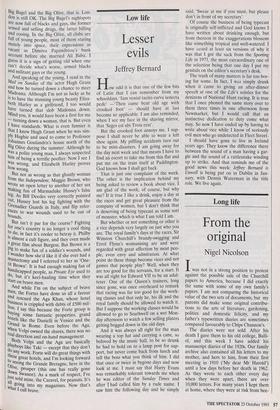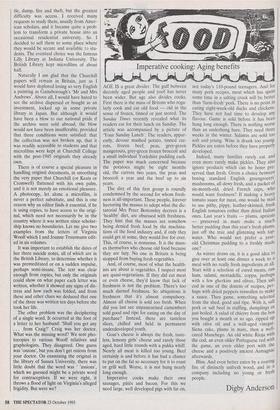Long life
From the original
Nigel Nicolson
Iwas not in a strong position to protest against the possible sale of the Churchill papers to America, because I did exactly the same with some of my own family's papers. I am not comparing the historical value of the two sets of documents, but my parents did make some original contribu- tions to the arts of literature, gardening, politics and domestic felicity, and my father's typewritten diaries are sometimes compared favourably to Chips Channon's.
The diaries were not sold. After his death I gave them to his old college, Balli- ol, and this week I have added his manuscript diaries of the 1920s. Our family archive also contained all his letters to my mother, and hers to him, from their first meeting in 1910 (`My dear Mr Harold') until a few days before her death in 1962. As they wrote to each other every day when they were apart, there are over 10,000 letters. For many years I kept them at home, where they were at risk from bee- tie, damp, fire and theft, but the greatest difficulty was access. I received many requests to study them, usually from Amer- ican scholars, and it became quite a prob- lem to transform a private house into an occasional residential university. So I decided to sell them to some place where they would be secure and available to stu- dents. The eventual choice was the famous Lilly Library at Indiana University. The British Library kept microfilms of about half.
Naturally I am glad that the Churchill papers will remain in Britain, just as I would have deplored losing so very English a painting as Gainsborough's 'Mr and Mrs Andrews'. Above all, I would have hated to see the archive dispersed or bought as an investment, locked up in some private library in Japan. But although it would have been a blow to our national pride if the archive were sold abroad, the blow would not have been insufferable, provided that three conditions were satisfied: that the collection was not broken up, that it was readily accessible to students and that microfilms were kept at Churchill College with the post-1945 originals they already own.
There is of course a special pleasure in handling original documents, in smoothing the very paper that Churchill (or Keats or Cromwell) flattened with his own palm, and it is not merely an emotional pleasure. A photocopy, let alone a microfilm, is never a perfect substitute, and this is one reason why an editor finds it essential, if he is using copies, to have access to the origi- nal, which need not necessarily be in the country where it was written since scholar- ship knows no boundaries. Let me give two examples from the letters of Virginia Woolf which I and Joanne Trautmann edit- ed in six volumes.
It was important to establish the dates of her three suicide notes, all of which are in the British Library, to determine whether it was premeditated or on a sudden impulse, perhaps semi-insane. The text was clear enough from copies, but only the originals could show on what paper each letter was written, whether it showed any signs of dis- tress and how each was folded, and from these and other clues we deduced that one of the three was written ten days before she took her life.
The other problem was the deciphering of a single word. It occurred at the foot of a letter to her husband: 'Shall you get any . .. from Craig?' Craig was her doctor. What was the missing word? We sent pho- tocopies to various Woolf relatives and graphologists. They disagreed. One guess was 'onions', but you don't get onions from your doctor. On examining the original in the library of Sussex University, there was little doubt that the word was "assions', which we guessed might be a private word for contraceptives. If we were right, it throws a flood of light on Virginia's alleged frigidity. But were we?



































































 Previous page
Previous page